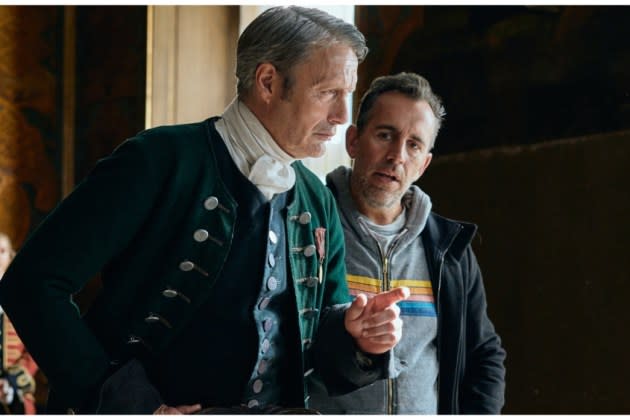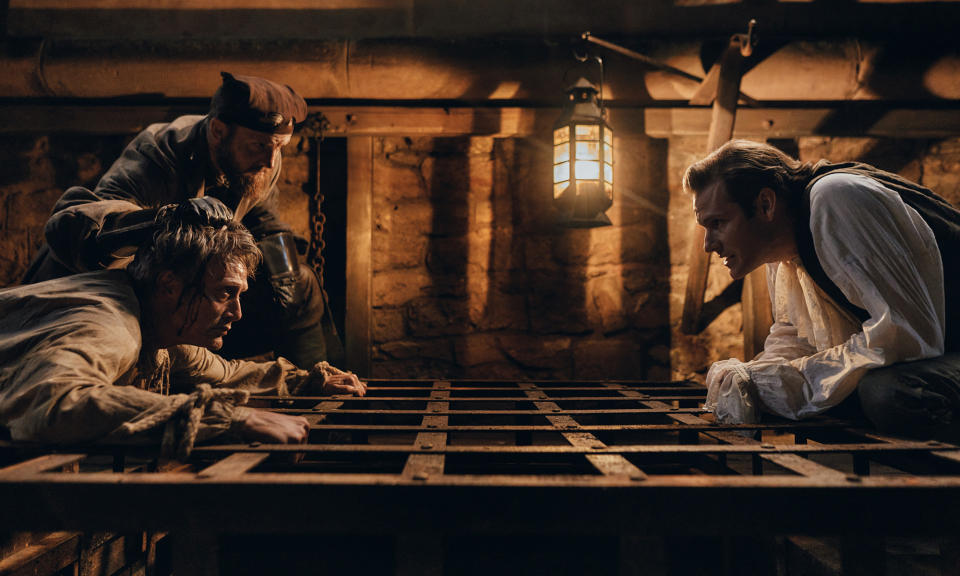‘The Dark Tower’ Director Nikolaj Arcel Talks Mads Mikkelsen Epic ‘The Promised Land’: ‘I Couldn’t Have Made It in Hollywood’
- Oops!Something went wrong.Please try again later.
- Oops!Something went wrong.Please try again later.
- Oops!Something went wrong.Please try again later.
- Oops!Something went wrong.Please try again later.

Danish filmmaker Nikolaj Arcel, who was behind “The Dark Tower” with Idris Elba and Matthew McConaughey – is bringing back the historical epic with “The Promised Land,” which world premieres in Venice Film Festival competition section.
Set in 1755 and based on a true story, it sees captain Ludvig Kahlen (played by Mads Mikkelsen) deciding to finally conquer the Danish heathland and build a colony there. But its ruler, Frederik de Schinkel (Simon Bennebjerg), doesn’t want to share the inhospitable land. Or anything else, for that matter.
More from Variety
Venice Opener 'Comandante' Scores U.S. Distribution (EXCLUSIVE)
'The Summer With Carmen,' Venice-Premiering Queer Comedy, Sells to the U.S., U.K. (EXCLUSIVE)
“Today, it’s more about action and superheroes, but I’m very interested in taking that genre, one that has gotten a bit lost, and modernizing it,” he says.
“It has this western quality because it’s about pioneers in a new land, trying to build something, but I was more interested in looking at old epics like ‘Lawrence of Arabia.’ I think it’s a genre we need.”
Despite his brushes with Hollywood, Arcel wanted to keep things local.
Produced by Louise Vesth for Zentropa Entertainments, it was co-written by his regular collaborator Anders Thomas Jensen, while TrustNordisk handles sales.
“I couldn’t have made this film in Hollywood. I would have to show Ludvig’s background, I would have to make him a hero and there would be action scenes all the time. That’s what I have learned from my time working there: it’s about making huge films for a huge amount of people. And when you do that, it’s not easy to tell a personal story,” he says.
“It’s personal, because Ludvig is consumed by this obsession to become somebody and I have also been totally driven by ambition. I’m 50 now and I just had kids. Before, it was all about work, work, work. I wanted to tell this story via Ludvig, because he is blind to what’s around him as well. I wasn’t as extreme, but it reminded me of my 30s and early 40s.”
No stranger to period films, having burst onto the stage with Alicia Vikander breakout “A Royal Affair” – also starring Mikkelsen – he wanted to take things further this time.
“The secret is not to worry too much about historical details. You have to surround yourself with the truth in terms of what was possible back then, but focus on the characters. Some historians will always say: ‘They would never do that.’ But I approach these stories as if they were modern,” he states, opening up about making his most violent film to date.
“I have been shying away from violence, but because it was such a tough environment, I didn’t want to ‘soften’ this reality. I love ‘A Royal Affair,’ but it’s so elegant and everything is nice and pretty. Now, I wanted to make a film that’s slightly more real and more character-driven.”
And one where the main conflict is between two men who couldn’t possibly be more different.
“Ludvig is all about control and order. Schinkel believes that life is complete chaos: you just have to give in, have fun and be evil. And you know what? I think he might be right!”
“We all know that life is crazy and there is no controlling it. As soon as we try, things go wrong. We lose our job, somebody dies. Their conversations were really fun to write.”
And yet, just like in the novel it’s based on – “Kaptajnen og Ann Barbara” by Ida Jessen – women are still front and center, led by Amanda Collin as titular runaway-turned-avenger.
“When I talked to Amanda, this was my pitch: ‘My true mission with this film is to take a character who is almost invisible and then slowly build her up to be the protagonist.’ Ann Barbara is in charge of everything and I’m so excited we managed to do that,” says Arcel.
Her clumsy interactions with Mikkelsen’s Ludvig brought some levity to the set, he recalls.
“Again, if you look at ‘A Royal Affair,’ it’s all about beauty and some very dramatic music. This time, it’s just quiet and awkward, and weird. It’s cold, they are hungry. They just need some human contact. It was funny to shoot, because Mads would ask: ‘Should I put my hand somewhere?’ And the answer was always: ‘No, just lie there,’” he laughs, complementing his actor.
“It takes a while until you start to understand who Ludvig is. Mads was a great help, because whenever I went, ‘Oh, maybe we should fall in love with him more,’ he would say: ‘You have to stay true to your vision!’ He gave me courage to do that.”
Arcel is not done with historical epics just yet, he assures.
“It’s definitely not my last. ‘The Promised Land’ is very different from ‘A Royal Affair’ and I hope my next film will be different as well, but it’s probably going to be set in the past again. There is something about real events and real characters that draws me in,” he says.
“There were obviously days when we were completely beaten and everybody was freezing, but I think that’s also part of the romance of making these kinds of films. It has to be a little tough. Otherwise, it’s just not worth it.”

Best of Variety
Sign up for Variety’s Newsletter. For the latest news, follow us on Facebook, Twitter, and Instagram.

